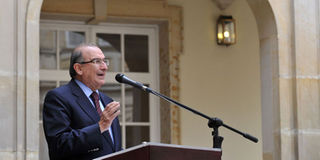Colombia pushes for more momentum in peace talks

PHOTO | GUILLERMO LEGARIA The head of the Colombian government peace negotiation team, Humberto de la Calle, speaks during a press conference at Narino Presidential Palace in Bogota, Colombia, on January 13, 2013. Colombia's government delegation will travel to Havana to resume talks on Monday with a delegation from Colombia´s largest leftist guerrilla group, the Revolutionary Armed Forces of Colombia (FARC), and start the third round of peace negotiations.
What you need to know:
- The longtime rivals launched the talks in October, their fourth attempt in three decades to close a battle that has left 600,000 people dead, 15,000 missing and four million displaced since 1964
BOGOTA
Colombia's government wants to pick up the pace of its peace negotiations with Marxist FARC rebels, the chief government negotiator said Sunday ahead of the continuation of talks in Cuba.
"We really need to get things moving. I want to make that known to people in general, as well as to the FARC," former vice president Humberto de la Calle told reporters ahead of his departure for Havana.
De la Calle and other negotiators for the government of President Juan Manuel Santos were set to leave for the Cuban capital later in the day for Monday's resumption of talks, which were put on hold over Christmas and New Year's.
"We do hold to the premise that this is a process that cannot be prolonged indefinitely," De la Calle said.
"While we do not have exact time limits for each point, we are aware that we have to move ahead swiftly."
The parties are under pressure to produce results in the coming months to end their half-century-old conflict, with Santos saying that negotiations must conclude by November.
The longtime rivals launched the talks in October, their fourth attempt in three decades to close a battle that has left 600,000 people dead, 15,000 missing and four million displaced since 1964.
Though the guerrilla group has declared a unilateral ceasefire until January 20, the government has continued its offensive against the rebels, accusing them of failing to respect their own truce by planting landmines and attacking civilians and soldiers.
The Revolutionary Armed Forces of Colombia (FARC) took up arms in 1964 to protest against the concentration of land ownership in the country, but a string of military defeats has cut its ranks to about 8,000 -- less than half of what it was in the late 1990s.
The key issue in the dispute, rural development, will be on the agenda when talks resume.
Venezuelan President Hugo Chavez was considered a key facilitator in the process, but the ailing leftist leader has been out of public sight since undergoing a fourth round of cancer surgery in Havana on December 11.




